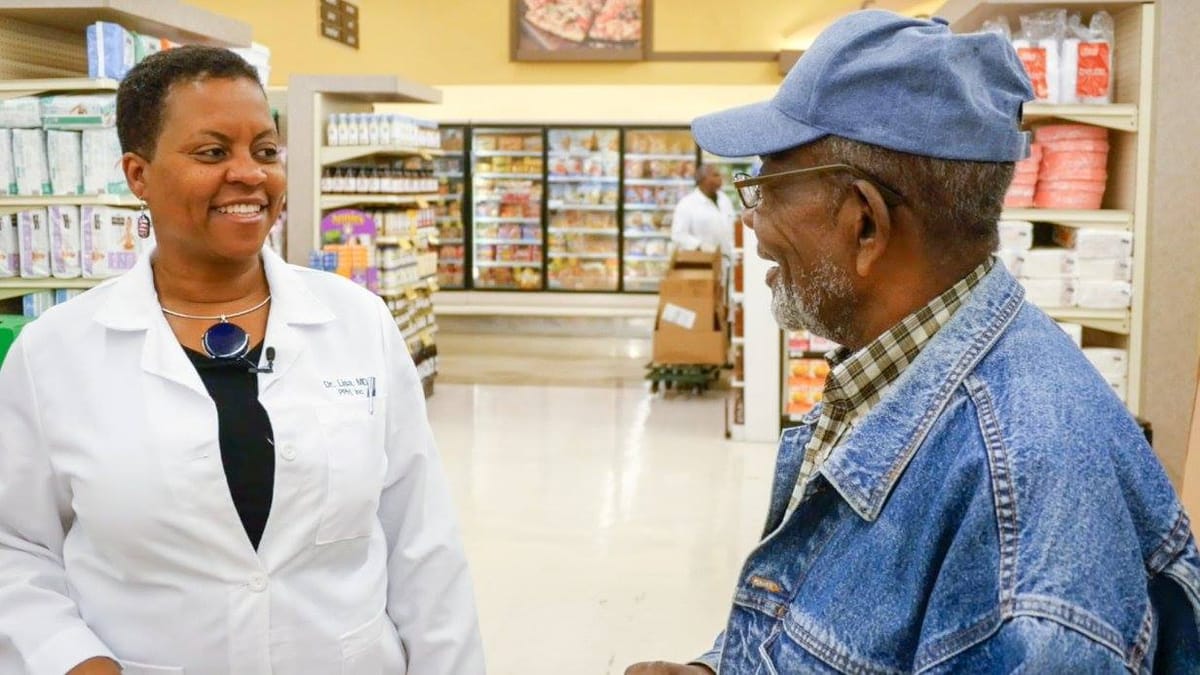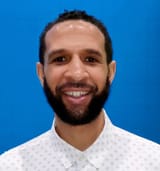REAL TALK = REAL TRUST: Grapevine's Health Literacy Messengers Build Trust in Underserved Communities

Trying to navigate the United States’ healthcare system can often feel like trying to learn a second language. For those in underserved communities, the lack of resources can make interpreting notes from your provider, or understanding a diagnosis, or a bill feel like an insurmountable obstacle.
For many non-white communities, there’s the added layer of mistrust stemming from a history of racism, compounded by the lack of representation.
According to a recent study done by Humana, 36% of all U.S. adults rate as having below-average health literacy. The term is defined as, “the ability to find, understand and use information and services to inform health-related decisions and actions for themselves and others,” per the U.S. Department of Health and Human Services. The deficit in health literacy is estimated to cost the U.S. $238 billion in inefficient healthcare costs.
Grapevine Health is a digital health communications company that is creating tailored health information resources with the goal of closing the health literacy gap; specifically in underserved Black and LatinX communities where some of the lowest health literacy rates exist. Grapevine’s staff of healthcare providers produce videos, blogs and podcasts, recording interactions its team of providers have with people they meet on the street, addressing general health questions. The content is then curated to match specific questions from policyholders of health insurers Grapevine is partnered with, and sent out via text message. Grapevine shares the broader content through their social media channels.
"We are on a journey to help build trust and increase engagement through creating relatable and culturally appropriate content for underserved communities.”
The term “health literacy” feels more like a stuffy, white-collar term that doesn’t quite fit what Grapevine is doing. After watching countless videos produced by Grapevine, the term that keeps coming to me is “real talk:” The type of conversations you have with a family member, an old neighborhood friend or an old teammate. Real talk happens in an environment where you can ask a question like, “what’s the difference between high blood pressure and hypertension” without worrying you’ll be talked down to.

Real talk only happens between people who trust each other and trust is exactly what Grapevine is building.
“The health systems want to build trust with the communities and this is a mechanism to do that,” said Grapevine founder and CEO, Lisa Fitzpatrick, MD MPH MPA. "Grapevine Health can serve as a bridge of trust, whether for a health system, with a payer, or healthcare providers. We are on a journey to help build trust and increase engagement through creating relatable and culturally appropriate content for underserved communities.”

Agents of Trust
I recently met with Dr. Fitzpatrick – who prefers to go by “Dr. Lisa” – and she shared with me that their primary challenge hasn’t been getting the attention of payers, but rather deploying their solutions broadly, so the people who would benefit from their content are easily able to access it.
“People (in the community) understand what we’re saying and we help them by speaking in plain language”
“What we’re finding is that a lot of it just sits on the shelf and never actually reaches people, which is very frustrating,” she said.
Dr. Lisa believes health payers look at Grapevine as one of many options to improve health literacy and fail to see Grapevine for what it is: An agent of trust.
“People (in the community) understand what we’re saying and we help them by speaking in plain language,” Dr. Lisa told me. “The messengers are people who look like them and that matters.”
Taking it to the Streets
For years, getting the message to the communities she was serving vexed Dr. Lisa, who is a board-certified infectious disease specialist and a medical epidemiologist. Despite extensive experience working with public and private health institutions, she always sensed a disconnect between the institutions she worked for and the people it served.
About 10 years ago – while on a panel, speaking to Black men about their health – she started thinking there was more she could do. It was at that meeting where she recalls a Black man in his 50s or 60s approaching her to ask how someone like him could regularly access a doctor like her.
“I knew there must be millions of people like him looking for a Black, trusted messenger to help them understand their health or healthcare,” she said. “So I left (the CDC) with an intention to get back on the ground to talk to people and help them better navigate their care …”
The seed for Grapevine started with a YouTube channel she launched in 2013, called, “Dr. Lisa on the Street.” The snippets recorded her interactions quizzing ordinary people on health-related terms and demystifying often complex and/or uncomfortable topics. In 2019, the success of her YouTube channel led Dr. Lisa to expand the project, creating Grapevine. The company now has 6 physicians building trust with community members in 7 cities across the U.S.
Simple, Fun, Effective
It’s not just underserved communities who wouldn’t know the exact function of a gallbladder, but the lack of resources leaves people with less resources exposed to crippling debt should they end up with costs not covered by insurance. Having more relatable health information empowers people to take their health in their own hands vs feeling intimidated by doctor speak (and who’s not?), ultimately improving engagement over avoidance. Grapevine has made healthcare a lighthearted, fun and engaging subject for those they meet.
Take this Grapevine-produced video, posted a year ago, where Dr. Lisa and her staff piece-meal how to navigate out-of-pocket health insurance costs. Among the people they meet are a man with a doctorate, a woman who took a course on health insurance and a man with four health insurance cards – each individual admits the matrix is a mystery to them.
Or this video, where Dr. Lisa quizzes a variety of people on terms like ‘exacerbate’ and ‘aspirate’ that doctors use regularly with patients without explaining what they mean. She then reminds her viewers they have every right to ask questions of their provider if they don’t know what they’re talking about.
A Must Have
These interactions are a prodding reminder of the universal need to improve health literacy. If Grapevine's solutions aren't deployed it remains difficult to measure the impact. The lack of real-world data limits the ability to showcase value to potential new clients, creating an echo chamber of problems.
"Our experience shows a connection between health literacy, trust and engagement in care, which really makes this a must have.”
Bridging the health equity gap may never be fully achievable and those committed to the work are often lacking in resources or the manpower to achieve the goals they desire. It’s a common theme across the healthcare sphere.
Dr. Lisa recalled a conversation she had with a healthcare executive during the pandemic that didn’t understand why they were having trouble with Black employees getting vaccinated. He wanted to know what Grapevine’s “secret sauce” was. When Dr. Lisa pointed out it’s as simple as pairing Black doctors with Black policyholders and talking to them on their level, the concept flew right over his head.
“Insurance companies believe it’s important to have some content available but ultimately I think they often believe health information is a nice to have, not a need to have," She said. "Our experience shows a connection between health literacy, trust and engagement in care, which really makes this a must have.”
Calling All Allies
Dr. Lisa and her staff are now looking for alternative ways to obtain funding, continue educating and engaging with those they are trying to reach. They recently received a Small Business Innovation grant from the National Science Foundation and are working to develop their own innovation to reach people directly through text and help them navigate their health.
"It is our responsibility to ensure health and science communication are understandable and accessible."
Community engagement is what started Grapevine and now, Dr. Lisa is asking the greater healthcare community to engage with her.
To health insurance policymakers:
“We must update our policies to ensure they facilitate our ability to communicate with patients and communities in the ways they want to obtain health information.”
To fellow clinicians and researchers:
“Understand that health information and science is pivotal to building trust and improving engagement. It is our responsibility to ensure health and science communication are understandable and accessible.”
And to those community members most impacted by disparities:
“We need your support to speak up and demand health and science institutions communicate in plain language. This ensures people have the information needed to make the best health decisions and to live their healthiest lives.”
Stephen Norris is a digital health leader and health equity advocate with over 10 years of experience building successful provider partnerships. Based in Seattle, WA, he's currently seeking new opportunities to leverage his expertise in a progressive, digital health setting.
His most recent role saw him leading strategic provider partnerships for a mission-driven, digital health startup in the workers' comp space. There, he built a robust provider network, leading provider adoption of the company's SaaS documentation platform. In doing so, he helped secure several Fortune 500 payers and spearheaded initiatives that expanded and retained key regional and national provider groups. Notably, he piloted the company's DEIJ initiatives, resulting in improved employee morale and record engagement.
Norris brings a well-rounded background in journalism and experiential marketing, which, when coupled with his provider partnership expertise and dedication to health equity, allows him to develop unique strategies for building and growing successful partnerships.
To contact Norris, you can email him at snorris32@gmail.com or reach out via Linkedin.




